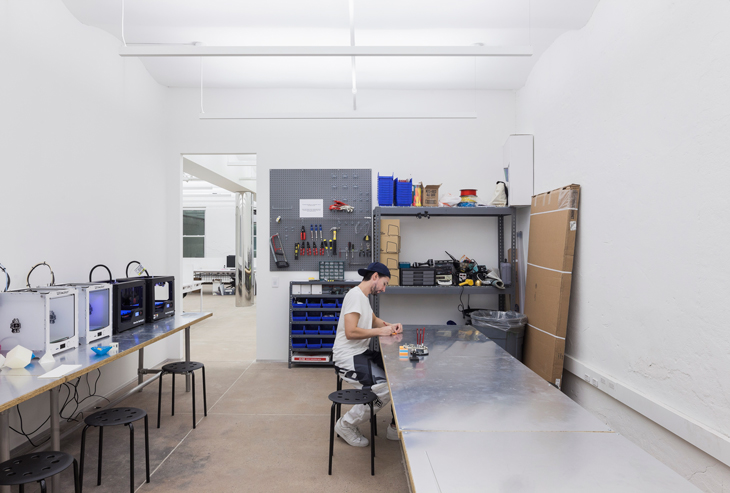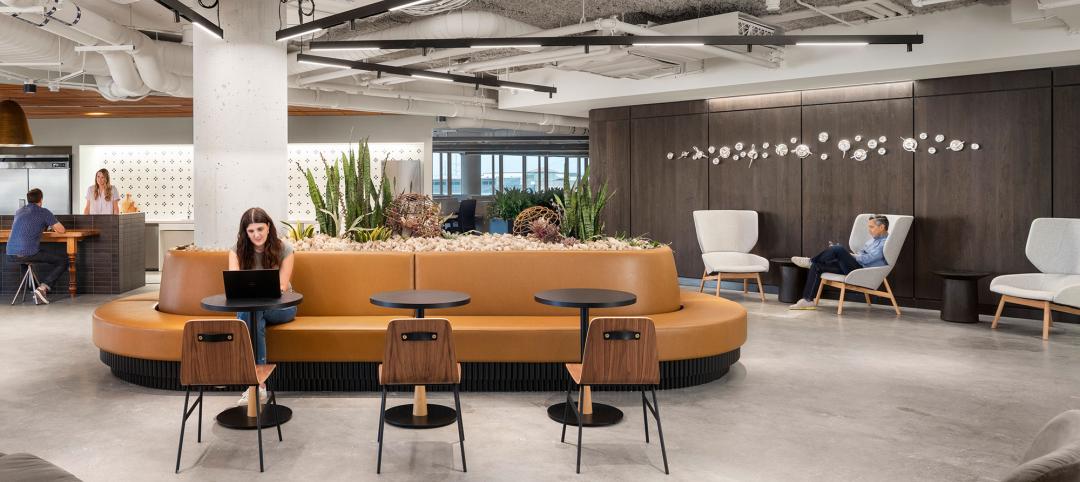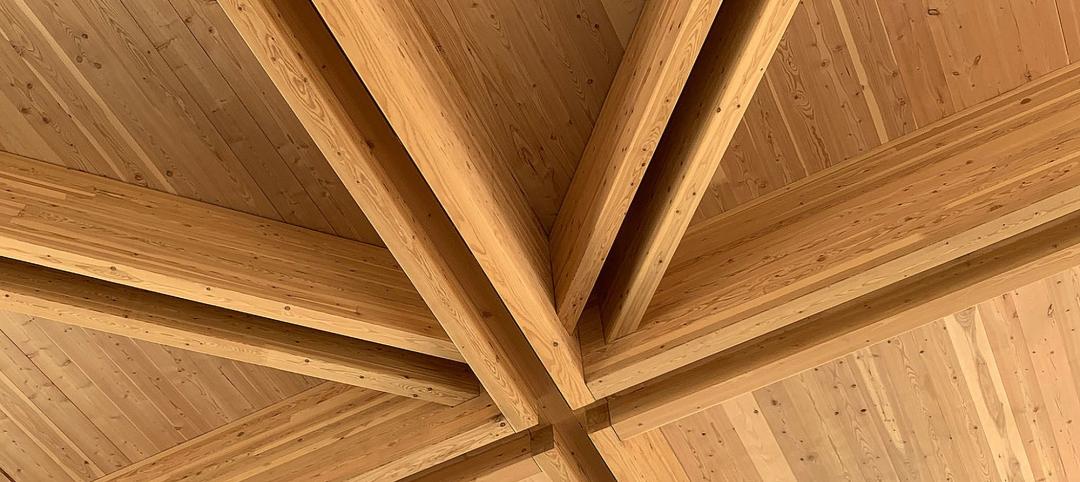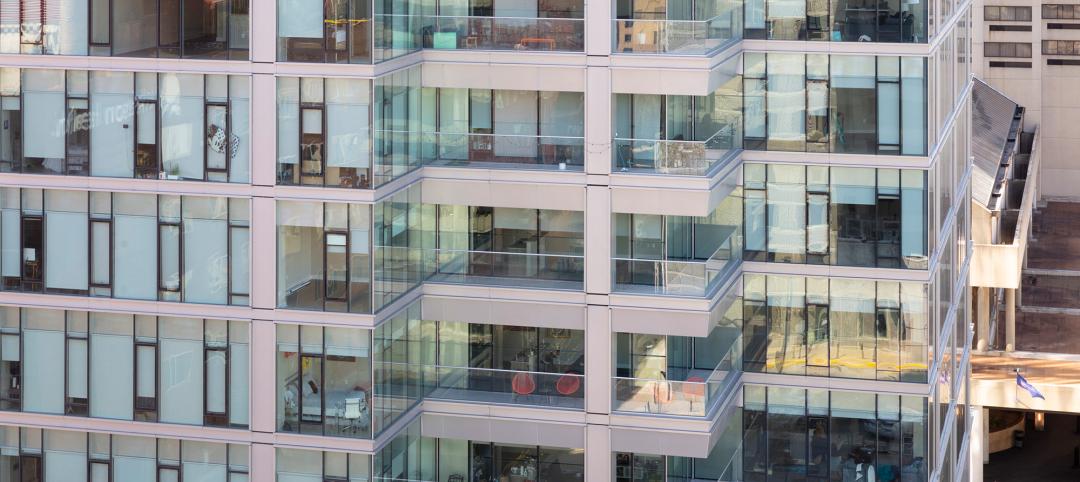This post is part of Gensler's series on Academic Incubators.
In November, the New Museum opened the doors of NEW INC, the first museum-led incubator. Just as incubators in the business and tech worlds nurture start-ups by providing mentorship, professional services, and a collaborative environment, the New Museum’s incubator cultivates innovations in design among emerging practitioners.
Part studio, part shared workplace, part lab, and part professional development program, NEW INC connects design with technology, the arts with the market, students with seasoned practitioners, and the museum with the world.
NEW INC is located in a small loft building next to the New Museum, at 231 Bowery Street. Unlike the typical classical or sleek modern exteriors we’ve come to expect from museums and cultural sites, the New Museum’s latest addition embraces its urban surroundings.
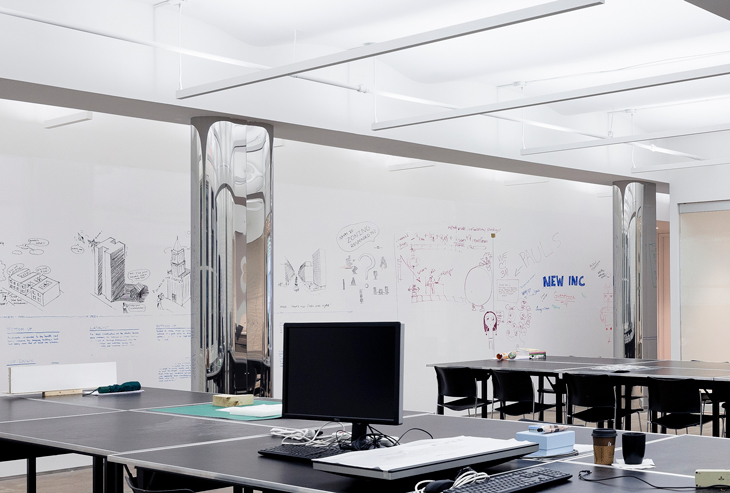 NEW INC, the New Museum's incubator. Image © New Museum
NEW INC, the New Museum's incubator. Image © New Museum
Gensler, in collaboration with the design firm SO-IL, preserved the original architecture and materials—brick, terracotta, steel—in the rough. With large windows bringing in the harbor-side light, the incubator space recreates the ideal studio—open and bright, with long desks, a variety of collaborative work areas, event and class-A prototyping space to accommodate different work styles and events. It’s like a tabula rasa—the ultimate in flexibility and choice.
The 11,000 sf of minimal infrastructure and reconfigurable furniture are meant to keep things from getting rigid and provoke collaborative exploration.
Underpinning that minimal and un-programmed aesthetic is a nuanced understanding of the fluid dynamics that the incubator cultivates. The one hundred selected NEW INC members spend six months to one year developing new ideas, practices, and their own professional direction. NEW INC also curates an annual events program suited to each cohort, including weekly master classes and workshops, skillshares, hackathons, public symposia, and monthly critiques. The idea is to create conversation between artists and practitioners such as New Museum curators, entrepreneurs, gallerists, designers, and other experts.
Current members include artist Ashley Zelinskie, whose future-focused work blurs the lines between art and technology; REIFY, one of the fastest growing companies at NEW INC that uses a range of 3-D printing materials (from coconut husk to bronze), and transforms sound waves into sculptural objects that can also be listened to; and The Principles, a collaboration between an architect, master craftsmen and industrial designer that aims to unite the disparate facets of architecture, fabrication, and industrial design.
Alongside this group of eclectic members are students and faculty from Studio-X of the Columbia Graduate School of Architecture, Planning, and Preservation (GSAPP). Studio-X is an interdisciplinary lab comprised of planners, architects, landscape designers, (etc.) undertaking research across the globe—spanning Johannesburg to Rio, Istanbul to Mumbai. Both of these groups intermingle, learn from, and collaborate with the affiliates of the New Museum. This includes not only its in-house artist-in-residence, curators, and public programs, but its global partners including IDEA CITY and Rhizome.
NEW INC ‘s arts and technology-driven framework offers an expanded field of resources and practices for Studio-X to pioneer experimentation. Incubators bring students together with professionals for mutual benefit. Students receive guidance in developing their projects and linking up to the market, while professionals get experience, connections and the opportunity to develop their own ideas within an institutional framework designed to promote innovation. Together they work and experiment, through different vantages of art, tech, architecture and design, to produce innovative projects that can take the form of living buildings, apps, counter-surveillance clothing, and interactive stories.
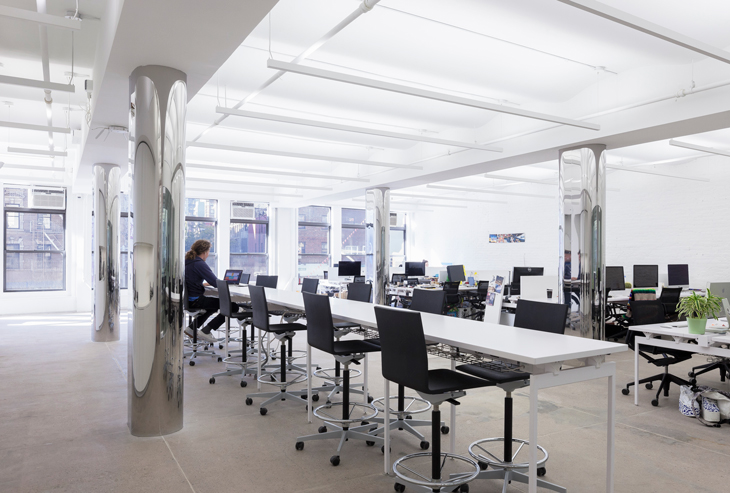 NEW INC, the New Museum's incubator. Image © New Museum
NEW INC, the New Museum's incubator. Image © New Museum
The New Museum was among the first to challenge the traditional museum model—permanent collection, fixation on the past, separation from the public world—and it has continuously pushed it in order to work in concert with other organizations and fields and to expand the cultural relevance of museum practices. The spirit of long-term exploration has steered the Museum since its inception, and still leads the way at NEW INC. It’s an exploration driven by an uncompromising dialogue with the urgent issues of the day. Those provocative intersections are the critical junctures where innovation occurs. To that end NEW INC is itself designed to fuse creative entrepreneurs working creatively at—and on—those junctures, and to recast culture in the process.
About the Author: Bevin Savage-Yamazaki has for many years worked collaboratively with artists, she recently installed a series of large complex art installations for Chris Burden and Carsten Höller at the New Museum. Prior to working at Gensler she worked on the construction of contemporary art museum Dia:Beacon, in Beacon, NY and has worked with artist’s Vito Acconci, Leni Schwendinger and Dennis Oppenheim on various projects in Europe and the US. She recently spoke at the Mountain Plains Museum Association Annual Conference in Aspen, CO on re-envisioning museums to further audience engagement. Learn more about Gensler's Education and Culture practice by contacting her at bevin_savage-yamazaki@gensler.com.
More from Author
Gensler | Oct 21, 2024
3 surprises impacting the return to the office
This blog series exploring Gensler's Workplace Survey shows the top three surprises uncovered in the return to the office.
Gensler | Jun 26, 2024
5 ways ESG can influence design and create opportunities
Gensler sustainability leaders Stacey Olson, Anthony Brower, and Audrey Handelman share five ways they're rethinking designing for ESG, using a science-based approach that can impact the ESG value chain.
Gensler | May 20, 2024
10 spaces that are no longer optional to create a great workplace
Amenities are no longer optional. The new role of the office is not only a place to get work done, but to provide a mix of work experiences for employees.
Gensler | Apr 15, 2024
3 ways the most innovative companies work differently
Gensler’s pre-pandemic workplace research reinforced that great workplace design drives creativity and innovation. Using six performance indicators, we're able to view workers’ perceptions of the quality of innovation, creativity, and leadership in an employee’s organization.
Gensler | Mar 13, 2024
Trends to watch shaping the future of ESG
Gensler’s Climate Action & Sustainability Services Leaders Anthony Brower, Juliette Morgan, and Kirsten Ritchie discuss trends shaping the future of environmental, social, and governance (ESG).
Gensler | Feb 15, 2024
5 things developers should know about mass timber
Gensler's Erik Barth, architect and regional design resilience leader, shares considerations for developers when looking at mass timber solutions.
Gensler | Jan 15, 2024
How to keep airports functional during construction
Gensler's aviation experts share new ideas about how to make the airport construction process better moving forward.
Gensler | Dec 18, 2023
The impacts of affordability, remote work, and personal safety on urban life
Data from Gensler's City Pulse Survey shows that although people are satisfied with their city's experience, it may not be enough.
Gensler | Nov 16, 2023
How inclusive design supports resilience and climate preparedness
Gail Napell, AIA, LEED AP BD+C, shares five tips and examples of inclusive design across a variety of building sectors.
Gensler | Oct 16, 2023
The impact of office-to-residential conversion on downtown areas
Gensler's Duanne Render looks at the incentives that could bring more office-to-residential conversions to life.

